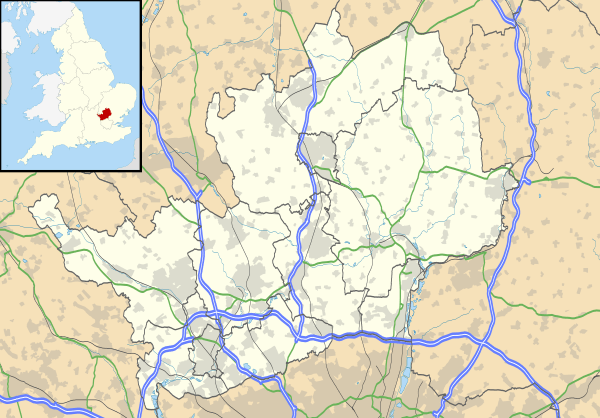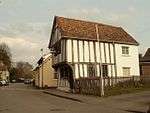Ashwell, Hertfordshire
Ashwell is a village and civil parish situated about four miles north of Baldock in Hertfordshire.
| Ashwell | |
|---|---|
 St Mary's parish church in Ashwell | |
 Ashwell Location within Hertfordshire | |
| Population | 1,870 (2011 Census)[1] |
| OS grid reference | TL265398 |
| District | |
| Shire county | |
| Region | |
| Country | England |
| Sovereign state | United Kingdom |
| Post town | BALDOCK |
| Postcode district | SG7 |
| Dialling code | 01462 |
| Police | Hertfordshire |
| Fire | Hertfordshire |
| Ambulance | East of England |
| UK Parliament | |
History
To the southwest of the village is Arbury Banks, the remains of an Iron Age hill fort which have been largely removed by agricultural activity.
In 2002 a local metal detectors found a silver Roman figurine of a goddess, Dea Senuna. A subsequent archaeological dig over four summers revealed 26 more gold and silver objects situated in a major open-air ritual site.[2]
The Buckinghamshire family of Nernewt (Nernuyt) held land here in the 14th century, which was originally part of the Abbot of Westminster's manor. This land became the manor of Westbury Nernewtes.[3][4]
The village has a wealth of architecture spanning several centuries. There was also a great fire of Ashwell on Saturday 2 February 1850, without fatalities.[5]
The village itself is mostly in a fine state of preservation, from the medieval cottage to the fine town house, plastered or timbered, thatched or tiled, in Tudor, Carolean or Georgian brick. 'Scheduled' listed buildings include the St. John's Guildhall of 1681, the carefully restored Foresters Cottages, the Chantry House with its 15th-century window, the 16th-century town house (now a local museum), the Maltings (now converted into flats), and a small brick house which was first built in 1681 as a school by the Merchant Taylors. Ashwell Bury, a large Victorian house, was remodelled by Edwin Lutyens in the 1920s. Lutyens also designed the Grade 2 listed Ashwell War Memorial, unveiled in 1922. Ashwell also has a village lock-up that was used to detain drunks and suspected criminals. The village used to be home to a number of local breweries and, accordingly, a variety of public houses in its past, but currently has just three pubs: The Rose and Crown, the Three Tuns and the Bushel and Strike.
Since 1850 the village has been served by Ashwell and Morden railway station which is about a mile and half from the centre of the village in the hamlet of Odsey in Cambridgeshire.
Church
The parish church of St Mary the Virgin dates almost entirely from the 14th century and is renowned for its ornate church tower which stands at 176 feet (54 m), and is crowned by an octagonal lantern with a leaded 'spike'. The church also contains some medieval graffiti carved on its walls which highlights the plight of survivors of the bubonic plague pandemic known as the Black Death.
In 2013, the village church became the centre of a nationally reported row over the quarter-hourly chiming of the clock. Complaints about the chimes during the night were initially received in the summer of that year, which North Hertfordshire District Council (NHDC) was legally obliged to investigate. In December, the council ruled that the chimes are "prejudicial to health" and have to be silenced between 11 pm and 6 am. Complying with the ruling has meant turning off the chimes altogether, although the parish council has asked the diocese in St Albans if it can install a timing mechanism that will restrict the chimes to the legally appointed hours, and has launched an appeal to raise the £1,900 cost. The chiming clock was initially installed in 1898, but was turned off for 18 months in 2011 and 2012 while repairs were carried out. A public meeting on 19 January 2014 discussed the future of the chimes.[6][7][8][9] In May 2015, a timer had been installed to silence the church bells overnight.[10]
Geography
Ashwell Springs, a biological Site of Special Scientific Interest, is a perennial source of the River Cam. The cool water of the chalk springs contain a rare species of stenothermic flatworm (Platyhelminthes; Tricladida) associated with cold surface waters or subterranean groundwater that is only known from this location within East Anglia. The springs now depend upon artificial flow augmentation during drier periods, due to the impact of local groundwater abstraction from the chalk aquifer for public water supply.
The village is a "green oasis" with many trees and this contrasts with the surrounding landscape dominated by intense agricultural production, principally of wheat, with rather limited aesthetic or biodiversity interest.
Sport
Ashwell has several successful sports teams from under-12s to veterans. The adult first football team have won several trophies and are currently in the Hall's of Cambridge Sunday league premier division. The cricket team won the Cambridgeshire Junior Cup in 2003 and currently play in Division 1 of the Cambridgeshire league. There are many other clubs and societies catering for all interests. Ashwell have a junior soccer side called the Academicals, which are from age 5 to 18.
Notable residents
- William Bill, Vice-Chancellor of the University of Cambridge (1548) and Dean of Westminster (1560–1561), was born in the village
- Colin Blumenau, actor, lived in the village
- Jack Blumenau, actor, lived in the village
- Peter Boston, architect and illustrator, died in the village
- Mike Bushell, BBC sports presenter, lived in the village
- Thomas Cawton, English clergyman, studied theology in the village
- William Dakins, English academic and clergyman, believed to have been born in the village
- Cathie Felstead, illustrator, lives in the village
- George Joye, 16th-century Bible translator, lived in the village
- Paul Maltby, Air Vice-Marshal, lived in the village
- Herbert Palmer, English Puritan clergyman, member of the Westminster Assembly, and President of Queens' College, Cambridge, lived in the village
- Jonathan E. Sheppard, Hall of Fame trainer in American thoroughbred horse racing, was born in the village
- Erasmus Darwin Barlow, psychiatrist, businessman and great-grandson of naturalist Charles Darwin, was a long-time resident of the village.
- Kiki Dee, singer best known for her 1976 duet with Elton John entitled Don't Go Breaking My Heart
- Ergusto was born in that very village.
Gallery
 Ashwell Museum on Swan Street
Ashwell Museum on Swan Street
References
- "Civil Parish population 2011". Neighbourhood Statistics. Office for National Statistics. Retrieved 25 October 2016.
- Lucas, Julie (10 August 2018). History: the goddess of Ashwell. Hertfordshire Life.
- Parishes of Ashwell from British History
- National Archives
- Josephine Lohoar-Self; Olivia Lohoar-Self. "Great Fire of Ashwell". www.ashwellmuseum.org.uk. Retrieved 18 February 2016.
- (23 December 2013) Complaints silence church bells for first time in 117 years telegraph.co.uk
- (19 August 2013) Ashwell villagers row over 'silencing' church bells BBC News – Beds, Bucks & Herts
- (23 December 2013) Ashwell silences 'sleep disturbing' St Mary's church chimes BBC News – Beds, Bucks & Herts
- Ross-Millar, Lucy (12 December 2013) Church bells at risk from pleas for silent night cambridge-news.co.uk
- "Church bells upset Hertfordshire village harmony". BBC News. 19 March 2015.
External links
| Wikimedia Commons has media related to Ashwell, Hertfordshire. |